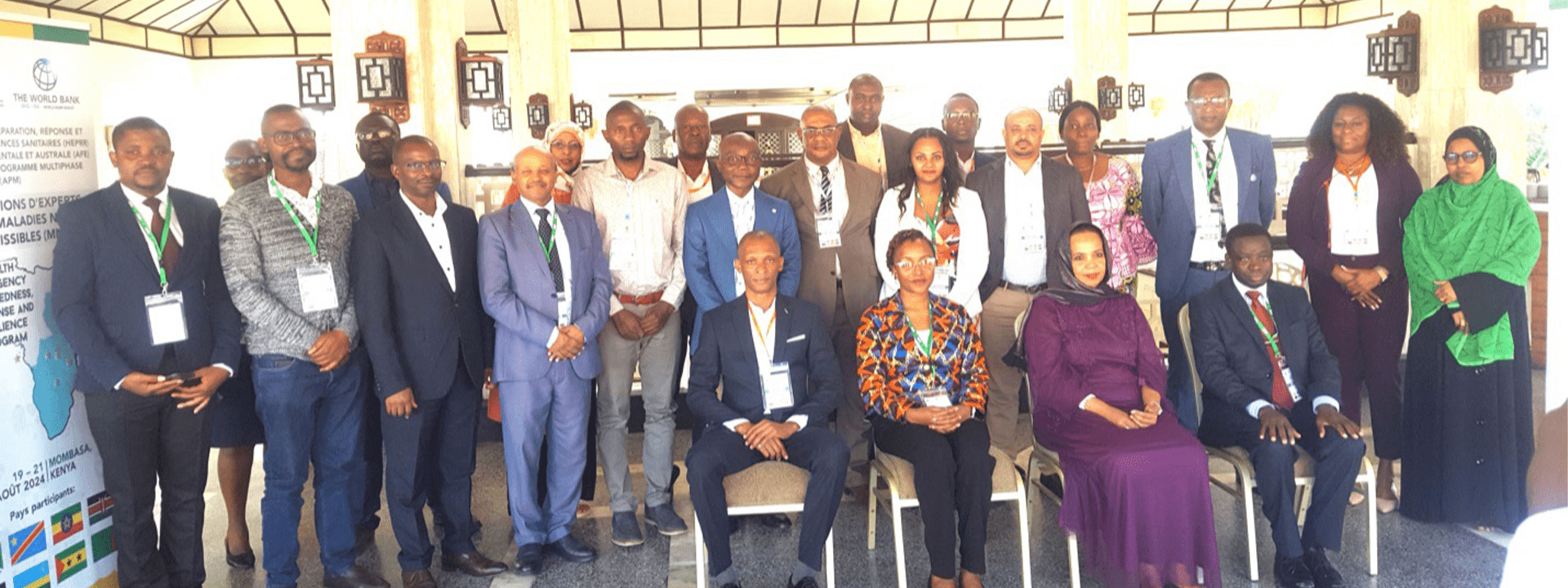August 21,2024 (MOMBASA, Kenya) : The Intergovernmental Authority on Development (IGAD) and the East, Central and southern Africa Health Community (ECSA_HC) in collaboration with the government of Sao Tome and Principe has conducted an expert Consultations on Non-Communicable Diseases, towards identifying national and regional priorities and challenges on non – communicable disease research under East, Central and southern Africa Health Community Health Emergency Preparedness, Response and Resilience Multiphase Programmatic Approach, in Mombasa, Kenya.
The main objective of the three days Health Emergency Preparedness, Response and Resilience Multiphase Programmatic Approach project is to strengthen health system resilience and multispectral preparedness and response to health emergencies in Eastern and Southern Africa.
Speaking on behalf of the IGAD Executive Secretary Dr. Workneh Gebeyehu, Madam Fathia Alwan, Director of Health and Social Development Diviion, IGAD, explained that the IGAD is bringing the comparative advantage of political aspect as well as the regional technical expertise in addressing the health impact since establishment of the health desk in 2005
Moreover, she expressed that the excellent technical team IGAD has in IGAD health and Social Development Division working on the regional healthcare issues and contribute to improvement of the health status of the citizens of IGAD region.
“For Non-Communicable Diseases (NCDs), we have started in 2012 with reproductive health tumors and this followed by a decision from our policy organs to establish a Centre of Excellence for Cancer and we are working on resources mobilization to actualize that decision,” she added.
The Director also thanks the World Bank for supporting this innovative initiative and provides us with opportunity to champion this initiative within your respective spheres of influence.
Prof Yoswa Dambisya, Director General of East, Central, Southern Africa-Health Community (ECSA-HC) highlighted that all countries are faced with an increasing burden of NCDs, and yet our health systems were designed for acute conditions such as malaria – treatment and recovery take a few days.
The General Director reminded that the previous experience with outbreaks such as Ebola or Codid-19 showed us that among the most affected were patients with preexisting chronic illnesses whose continuity of care was affected.
“NCDs such as diabetes mellitus require long, ongoing care and support. So let’s ensure that we find ways of leveraging the MPA resources to make our health systems responsive to the NCD challenges in the face of any outbreak,” The professor urged.
In his remarks, Leonel Rosario Jesus Carvalhoo, Permanent Secretary of Sao Tome Principe Ministry of Health explained that IGAD with its key role in coordinating and promoting regional initiatives is a valuable partner in creating a comprehensive approach to tackling non-communicable disease.
The Permanent Secretary further emphasized that the Sao Tome and Principe, as it assumes the presidency of this vital program, is committed to leading efforts to strengthen Health emergency preparedness and response with a special focus on non-communicable disease.
“We came to collaborate in an effective and coordinated manner to address these challenges by promoting policies and strategies. We want to explore innovative solutions that are adaptable, to local needs, while promoting solidarity and sharing of best practices among countries,” he noted.
Dr. Joan-Paula Bor-Malenya, Head of Kenya MOH-National Cancer Control Program, on behalf of Head, Division of Cancer & NCDs, Dr. Gladwell Gathecha , as a host country, disclosed that the cross-border nature of many NCD risk factors calls for regional cooperation in implementing standardized policies and sharing best practices. Collective action is required to strengthen health systems, enhance research, and improve access to affordable care for NCDs across the IGAD region.
“ It is crucial that we address non-communicable diseases as a growing public health concern in the region, and we have a shared responsibility as nations to tackle NCDs through collaboration and mutual support”, Dr. Joan-Paula Bor-Malenya noted.
The Technical Consultations workshop brought together experts from Ethiopia, Kenya, Burundi, the Democratic Republic of Congo and Sao Tome & Principe.
Budget for the consultation workshop financed by World Bank.
Subsequently, the expert’s consultation workshop from 19th to 21August2024 resulted in understanding of the situational analysis and current focus of countries in programs, policies, and research on non-communicable diseases, as well as, research opportunities and priorities in informing protocol for joint regional research proposals/research concepts on non-communicable diseases to be implemented in the project countries.
Finally, the work shop concluded successfully, in discussing on the way forward how to coordinate the research agenda on NCDs and the way forward on enhancing participation and by closing a remark delivered by the East, Central and southern Africa Health Community.
The Health Emergency Preparedness, Response and Resilience Program for Eastern and Southern Africa is a regional program implemented in Multiphase Programmatic Approach, covering three countries in phase 1 namely, Ethiopia, Kenya and Sao Tome & Principe; three countries in phase 2 namely, Burundi, Democratic Republic of Congo and Rwanda; and other countries joining the project from phase 3.
The Intergovernmental Authority on Development (IGAD) and the East, Central and southern Africa _Health Community (ECSA_HC) serve as the regional entities for implementing the regional components of the project complementing country-level interventions.

